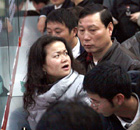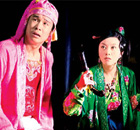Foreign and Military Affairs
DPRK, Japan urged to fix ties, resume nuke talks
By Wen Yu in Tokyo and Li Xiaokun in Beijing (China Daily)
Updated: 2009-12-17 07:18
 |
Large Medium Small |
Vice-President Xi Jinping yesterday applauded recent "easing signals" on the Korean Peninsula and called on Tokyo to repair ties with Pyongyang and help push forward the resumption of denuclearization talks.
| ||||
He is likely to discuss the nuclear issue with the President of the Republic of Korea (ROK), Lee Myung-bak, when they have breakfast together this morning before Lee heads to Copenhagen for the climate change talks.
Chinese experts said Pyongyang may make strides toward revitalizing ties with Tokyo but a major shift in Japan's attitude is unlikely.
The comments came days after Washington and Pyongyang agreed last week to resume stalled talks. The breakthrough came during a visit to Pyongyang by top US nuclear envoy Stephen Bosworth.
However, Pyongyang has not yet made a firm commitment as to exactly when the talks can resume.
The Associated Press yesterday quoted an unnamed senior US official as saying Bosworth even took a personal letter from US President Barack Obama to Democratic People's Republic of Korea (DPRK) leader Kim Jong-il, urging the country to return to negotiations. The official was not aware of whether Kim responded.
Pyongyang also told Bosworth the DPRK was open to dialogue with Japan. Ties between the neighbors have been strained for decades. Flashpoints include claims from Japan that its citizens have been abducted by agents from the DPRK. The DPRK has acknowledged it had 13 Japanese people in its custody and it returned five to Japanese authorities. It said the other eight were dead.
Zhang Liangui, an expert on the DPRK at the Central Party School in Beijing, said Pyongyang is likely to want to improve its ties with Japan to persuade other countries to acknowledge its status as a nuclear nation.
"Perhaps it will offer new concessions on the abduction issue, such as re-launching an investigation or giving back the remains or things left by the dead abductees."
But Japan will not be easily moved unless Pyongyang makes bigger strides. He said many people in Japan believe more than 13 people were abducted.
The ROK's Yonhap news agency reported yesterday DPRK officials told Bosworth UN sanctions, in place since June, in response to nuclear testing must be lifted.
The ROK's foreign minister responded yesterday by saying the sanctions would remain in place during diplomatic efforts to revive talks. At the same time, ROK's chief nuclear envoy left for Moscow yesterday for consultations.
Zhang Jin contributed to the story











